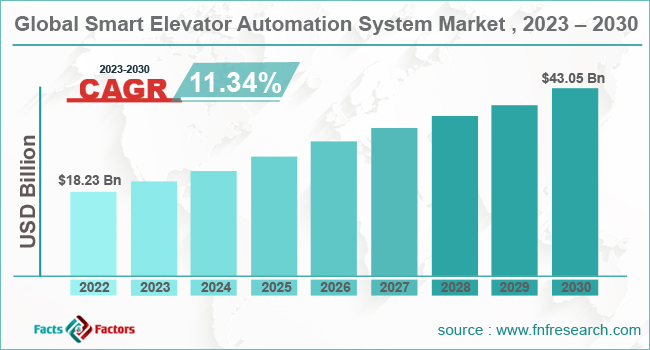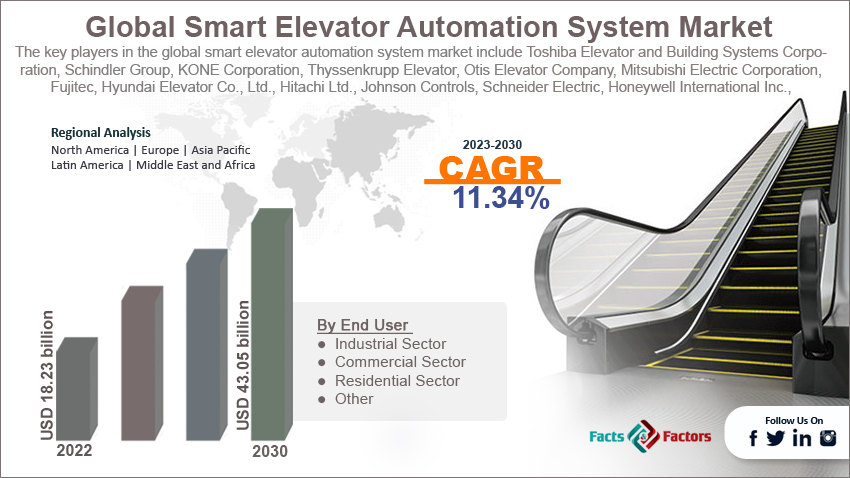Search Market Research Report
Smart Elevator Automation System Market Size, Share Global Analysis Report, 2023 – 2030

Smart Elevator Automation System Market Size, Share, Growth Analysis Report By End User (Industrial Sector, Commercial Sector, Residential Sector, And Other), By Service (Modernization Service, Maintenance & Repair, And Installation Service), By Component (Building Management System, Sensors, Motors, & Automation System, Security & Control System, Touch Screen & Keypad, Biometric And Card Reader), And By Region - Global and Regional Industry Insights, Overview, Comprehensive Analysis, Trends, Statistical Research, Market Intelligence, Historical Data and Forecast 2023 – 2030
Industry Insights
[205+ Pages Report] According to Facts and Factors, the global smart elevator automation system market size was valued at USD 18.23 billion in 2022 and is likely to surpass USD 43.05 billion by the end of 2030. The smart elevator automation system industry is expected to grow with a CAGR of 11.34% during the forecast period.

 Market Overview
Market Overview
The smart elevator automation system refers to the advanced technology innovated to improve the safety, efficiency, operation, and user experience of elevators in buildings. The system makes use of a wide range of connectivity features, data analytics, and sensors to revolutionize traditional elevators into advanced interconnected systems.
The smart elevators are well equipped with proximity sensors, weight sensors, and motion sensors to collect data regarding the elevator car positions, passenger moments, and environmental conditions within the elevator, which further help the manufacturers improve the working of the elevator system.
 Key Insights
Key Insights
- As per the analysis shared by our research analyst, the global smart elevator automation system market size is estimated to grow annually at a CAGR of around 11.34% over the forecast period (2023-2030).
- In terms of revenue, the global smart elevator automation system market size was valued at around USD 18.23 billion in 2022 and is projected to reach USD 43.05 billion by 2030.
- Urbanization and high-rise building constructions are driving the growth of the global smart elevator automation system market.
- Based on the end user, the commercial sector segment is growing at a high rate and is projected to dominate the global market.
- Based on the service, the installation services segment is projected to swipe the largest market share.
- Based on the component, the security and control system segment is the fastest-growing segment of the global market.
- Based on region, North America is expected to dominate the global market during the forecast period.

 Growth Drivers
Growth Drivers
- Urbanization and high-rise building constructions are likely to drive the growth of the global market.
The increasing rate of urbanization in different parts of the world is posing a huge demand for high-rise buildings like multi-story residential complexes and skyscrapers. With an increasing demand for taller and more complex buildings, there is a high requirement for an efficient vertical transportation solution, which is fostering a huge demand for smart elevators.
Sustainability and energy efficiency are the basic requirements in modern construction and operations. Therefore, smart elevators well equipped with energy-efficient features like LED lighting, energy optimization algorithms, and regenerative drives are more in demand.
Moreover, they help in reducing the operation of energy consumption and thereby aligning with the environmental goals and regulations. Therefore, such a landscape is expected to propel the growth of the global smart elevator automation system market. For instance, Kone Elevators revealed the world’s first Digitally Connected Elevators – the KONE DX class at EXCON 2022 in May 2022.
 Restraints
Restraints
- High initial costs and a longer payback period are likely to restrain the growth of the global market.
Installation of smart elevator technology requires high upfront costs because of the requirement of sophisticated systems like control panels, sensors, and other sophisticated equipment. Therefore, the small and medium budget constraint projects cannot include this technology in their systems.
Moreover, the return on investment is quite late, and therefore, investors are hesitating to invest in smart elevator systems. This is likely to hamper the expansion of the smart elevator automation system industry to a certain extent during the coming period
 Opportunities
Opportunities
- Improved user experience is likely to foster huge growth opportunities in the global market.
The operators and vendors are increasingly focusing on offering a super-rich user experience to visitors, employees, and tenants. Smart elevators offer features like touchless control, personalized service, destination control systems, and improved satisfaction & convenience, and therefore, operators are increasingly installing smart elevator technologies in their buildings.
Moreover, the densely populated areas require efficient vertical transportation to manage the traffic, thereby reducing congestion. Therefore, the rising number of metro cities is significantly pushing the growth of the global smart elevator automation system market.
For instance, the Schindler group demonstrated modern tech by letting the robotic installation in August 2021 in Singapore. The major goal is to launch a technology that helps in performing the elevator installation steps independently.
 Challenges
Challenges
- Legacy systems are a big challenge in the global market.
A large number of buildings are still using the old elevator system, which cannot install and retrofit the smart technology. However, replacing these legacy systems is quite disruptive and expensive. Moreover, integrating smart elevators with other building systems like HVAC and security further requires specialized expertise. Therefore, building owners find it quite challenging to integrate smart technology into their existing infrastructure.
 Segmentation Analysis
Segmentation Analysis
The global smart elevator automation system market can be segmented into end-user, service, component, and region.
By end-user, the market can be segmented into the industrial sector, commercial sector, residential sector, and others. The commercial sector accounts for the largest share of the smart elevator automation system industry. The high adoption rate of smart elevator automation systems in commercial buildings is one of the major reasons for the growth of the segment.
Moreover, the commercial buildings attract higher traffic as compared to other options, which results in more usage of elevators in the buildings. Also, the smart elevator automation system is highly being used in commercial buildings to reduce energy costs and improve productivity.
Thereby, it is majorly installed in offices, malls, restaurants, hotels, etc. Additionally, smart elevated technology is highly utilized in the trip management sector. Smart elevators help users to travel with less waiting times, and therefore, this technology is gaining immense popularity in the commercial sector.
By service, the smart elevator automation system market can be segmented into modernization service, maintenance & repair, and installation service. The installation services segment is anticipated to register a notable growth rate in the coming years. The installation services involve the configuration and initial setup of the smart elevator system in the new or existing buildings.
However, the segment includes various services like the installation of sensor safety features, control systems, elevator cars, and other components. These services are important for the proper functioning of an elevator system. However, the installation service providers work in collaboration with the developers, builders, and architects to ensure that elevators are installed seamlessly into the building designs and thereby meet all the regulatory requirements.
By component, the market can be segmented into building management systems, sensors, motors, & automation systems, security & control systems, touch screens & keypads, and biometric and card readers. The security and control system segment is anticipated to dominate the smart elevator automation system industry in the forthcoming years.
Security and control systems are crucial for ensuring the security and safety of the passengers. It includes various features like remote monitoring, an emergency communication system, surveillance cameras, and access control. The system helps in preventing unauthorized access, active response to emergency situations, and proper monitoring of passenger safety.
 Report Scope
Report Scope
Report Attribute |
Details |
Market Size in 2022 |
USD 18.23 Billion |
Projected Market Size in 2030 |
USD 43.05 Billion |
CAGR Growth Rate |
11.34% CAGR |
Base Year |
2022 |
Forecast Years |
2023-2030 |
Key Market Players |
Toshiba Elevator and Building Systems Corporation, Schindler Group, KONE Corporation, Thyssenkrupp Elevator, Otis Elevator Company, Mitsubishi Electric Corporation, Fujitec, Hyundai Elevator Co. Ltd., Hitachi Ltd., Johnson Controls, Schneider Electric, Honeywell International Inc., Kawasaki Heavy Industries Ltd, Bosch Building Technologies, Thyssenkrupp AG, Schaefer Elevator Components, Wittur Group, Zicom, and Others. |
Key Segment |
By End User, By Service, By Component, and Region |
Major Regions Covered |
North America, Europe, Asia Pacific, Latin America, and the Middle East &, Africa |
Purchase Options |
Request customized purchase options to meet your research needs. Explore purchase options |
 Regional Analysis
Regional Analysis
- North America to dominate the global market.
North America accounts for the largest share of the global smart elevator automation system market. The regional market is highly driven by various factors like growing urbanization and increasing construction of high-rise buildings. Architects and developers are nowadays constructing advanced buildings that include sophisticated digital systems like smart elevator automation systems to attract customers and make them a premium property.
Also, the technological advancements in the smart elevator automation industry, like cloud-based solutions and integration of IoT, further revolutionizing these traditional elevators and, thereby, improving efficiency. Moreover, the region is at the forefront of adopting advanced technology production. Therefore, it is expected to widen the scope of the market in the region.
Asia Pacific is expected to experience a high growth rate in the forthcoming years because of the increasing industrialization and urbanization in the region. Urbanization and population growth are posing a huge demand for high-rise advanced buildings in the cities, which is likely to drive the demand for advanced elevator technologies.
Moreover, the increasing smart city integration in the region is likely to further pose a huge demand for smart elevator systems for seamless urban mobility and building management. For instance, Hitachi Elevator Co. said to showcase the entire smart building solution business in March 2022 for the first time in Thailand and Southeast Asia.
 Competitive Analysis
Competitive Analysis
- Toshiba Elevator and Building Systems Corporation
- Schindler Group
- KONE Corporation
- Thyssenkrupp Elevator
- Otis Elevator Company
- Mitsubishi Electric Corporation
- Fujitec
- Hyundai Elevator Co. Ltd.
- Hitachi Ltd.
- Johnson Controls
- Schneider Electric
- Honeywell International Inc.
- Kawasaki Heavy Industries Ltd
- Bosch Building Technologies
- Thyssenkrupp AG
- Schaefer Elevator Components
- Wittur Group
- Zicom
The global smart elevator automation system market is segmented as follows:
 By End User Segment Analysis
By End User Segment Analysis
- Industrial Sector
- Commercial Sector
- Residential Sector
- Other
 By Service Segment Analysis
By Service Segment Analysis
- Modernization Service
- Maintenance & Repair
- Installation Service
 By Component Segment Analysis
By Component Segment Analysis
- Building Management System
- Sensors, Motors, & Automation System
- Security & Control System
- Touch Screen & Keypad
- Biometric
- Card Reader
 By Regional Segment Analysis
By Regional Segment Analysis
- North America
- The U.S.
- Canada
- Mexico
- Europe
- France
- The UK
- Spain
- Germany
- Italy
- Rest of Europe
- Asia Pacific
- China
- Japan
- India
- Australia
- Southeast Asia
- Rest of Asia Pacific
- The Middle East & Africa
- Saudi Arabia
- UAE
- Egypt
- Kuwait
- South Africa
- Rest of the Middle East & Africa
- Latin America
- Brazil
- Argentina
- Rest of Latin America
Industry Major Market Players
Frequently Asked Questions

Copyright © 2025 - 2026, All Rights Reserved, Facts and Factors


